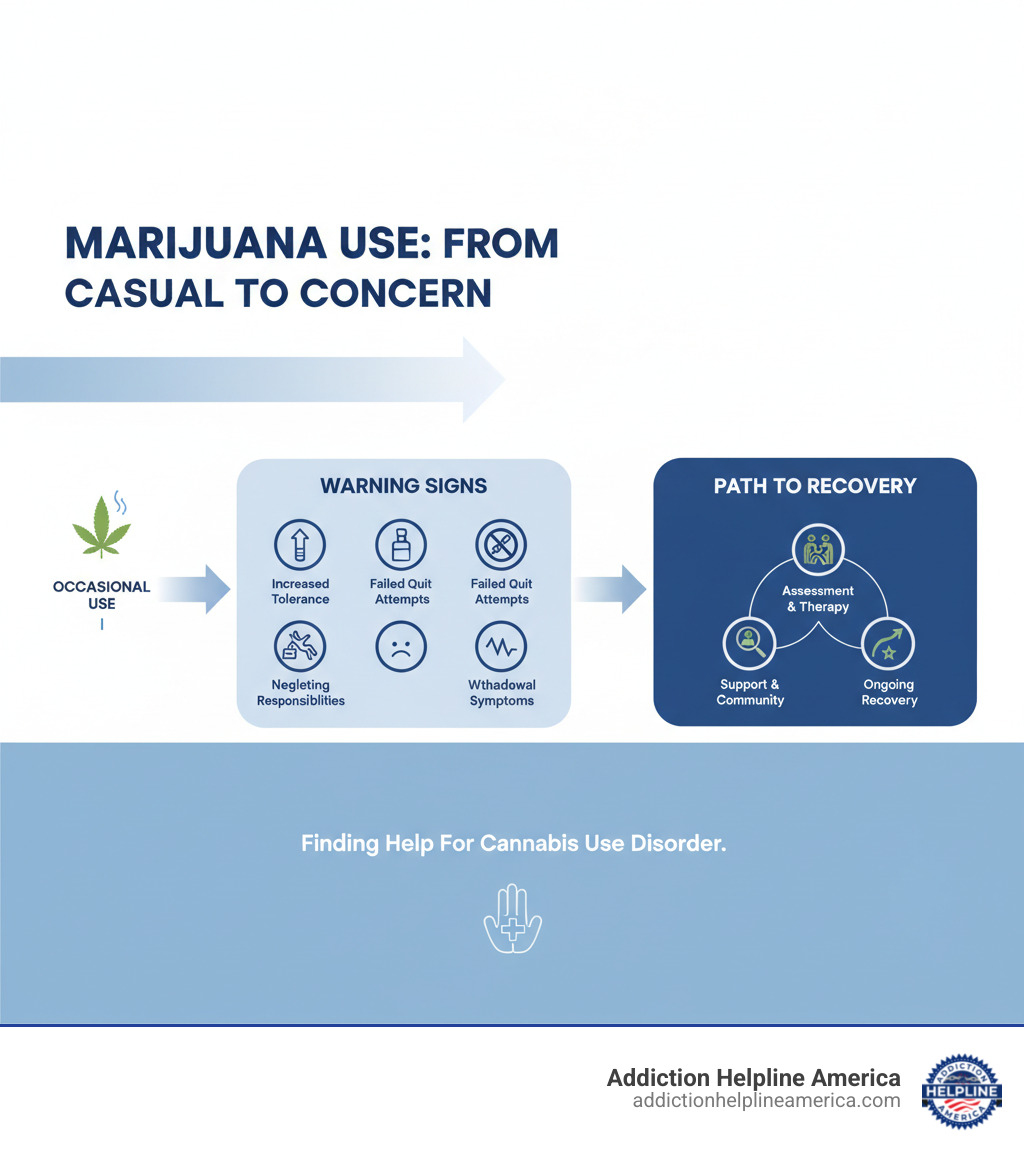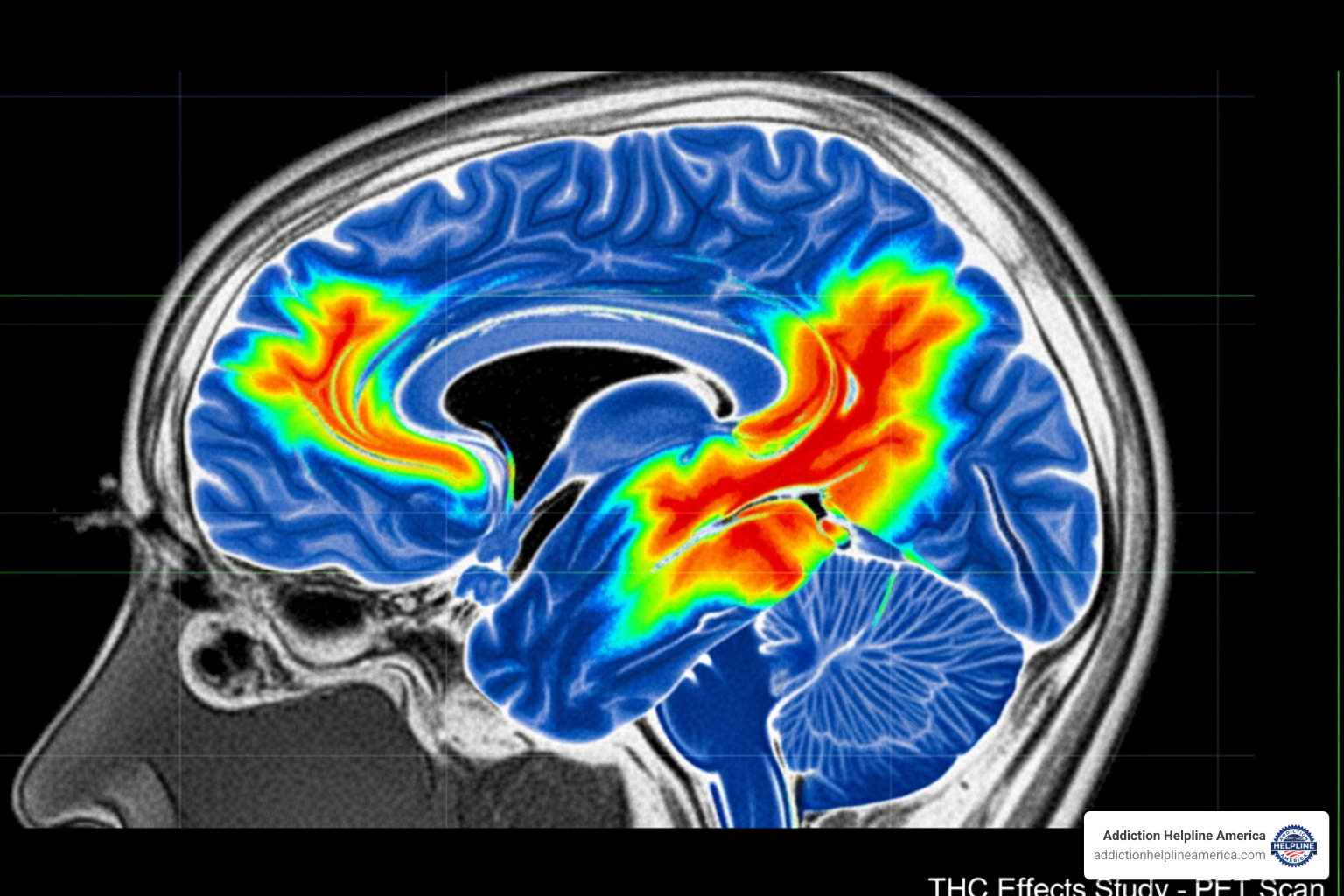
Understanding the Growing Need for Marijuana Rehab Programs
Marijuana rehab programs offer specialized treatment for cannabis use disorder. They provide a structured path to recovery through services like assessment, personalized treatment planning, therapy (such as CBT), withdrawal management, and aftercare support. Many also treat co-occurring mental health disorders like depression or anxiety.
Despite its legal status in many states, marijuana addiction is real. Research shows about 30% of users may develop a marijuana use disorder, and for regular users, about 10% become addicted. The confusion is understandable: how can something legal be addictive? But legality doesn’t equal safety. Like alcohol, marijuana can lead to dependence, especially as modern THC potency has dramatically increased.
Many people try to quit on their own, only to face withdrawal symptoms like irritability, insomnia, and intense cravings. If this cycle of failed attempts and declining well-being sounds familiar, you are not alone—and help is available.
At Addiction Helpline America, we connect individuals with effective marijuana rehab programs. Our specialists offer free, confidential guidance 24/7 to help you find the right path, whether it’s inpatient, outpatient, or virtual care.
Marijuana rehab programs terms explained:
Understanding Marijuana Addiction and the Need for Treatment
It often surprises people, but marijuana can be genuinely addictive. The medical condition is called Marijuana Use Disorder (MUD), and it occurs when someone loses control over their cannabis use, causing real-life problems. The addiction is not just physical; the psychological grip is often stronger, weaving cannabis into how a person handles stress, boredom, and daily life.
Today’s marijuana is significantly more potent. High levels of THC, the psychoactive compound, flood the brain’s dopamine system. With regular use, the brain adapts by producing less dopamine naturally, leading to tolerance—needing more to feel the same effects. This is how the cycle of addiction begins. Research shows about 30% of marijuana users may develop MUD, with the addiction rate rising to one in ten for regular users. These numbers represent millions who need help from marijuana rehab programs.
Signs and Symptoms of Marijuana Addiction
Recognizing when use has crossed into addiction is the first step. Key signs include neglecting work, school, or family responsibilities; failed attempts to quit or cut back; and intense, persistent cravings. Many continue using despite clear negative consequences, such as relationship conflicts or financial trouble, sometimes to avoid withdrawal symptoms. Other red flags are social isolation, losing interest in once-loved activities, hiding the extent of use from others, and engaging in risky behaviors like driving while high. If these patterns are familiar, it’s time to consider professional support.
Long-Term Effects and Risks of Chronic Use
Chronic marijuana use has significant long-term consequences. Cognitively, it can lead to a general mental fogginess, memory problems, and difficulty learning. Mentally, it’s linked to increased anxiety, paranoia, and a higher risk of psychosis, especially for those with a genetic predisposition. It can also worsen depression. Physically, smoking damages the lungs similarly to tobacco, causing chronic bronchitis and frequent lung infections. The risks for young adults are particularly severe, as use during adolescence can permanently alter brain development and has been linked to a drop in IQ.
Marijuana Withdrawal and Detox
Quitting marijuana after heavy use leads to real withdrawal symptoms. While not life-threatening, the discomfort is often enough to cause relapse. Symptoms peak in the first few days and can include irritability, anxiety, depression, insomnia, headaches, and intense cravings. Users may also experience restlessness, appetite loss, and mood swings. You don’t have to endure this alone. Detox programs provide a supervised environment where medical staff can help manage symptoms safely. During detox, the brain begins to heal. Research on cannabinoid receptor recovery shows that these receptors can return to normal functioning after about four weeks of abstinence, providing a biological foundation for lasting recovery.
How to Choose Among Marijuana Rehab Programs
Finding the right marijuana rehab program is a personal decision, and the options can feel overwhelming. The goal is to find a program that offers personalized treatment based on your unique history, mental health, and life situation. The process usually starts with a comprehensive assessment with an addiction specialist to determine the most appropriate level of care. As you explore options, look for accreditations from organizations like CARF or The Joint Commission, which signify high standards for safety and effectiveness.
Comparing Inpatient, Outpatient, and Virtual Options
Marijuana rehab programs offer different levels of care to fit various needs.
Inpatient (residential) treatment provides 24/7 support in a trigger-free environment, usually for 30-90 days. It’s best for severe addiction or co-occurring disorders. Our Treatment: Residential page explains more.
Outpatient treatment allows you to live at home while attending regular therapy sessions. It’s a flexible and more affordable option for those with less severe addiction and a stable home environment.
Virtual care (telehealth) offers access to counseling and support groups remotely. It’s ideal for those needing privacy, flexibility, or who live in rural areas. Our Inpatient vs Outpatient Rehab guide compares these options in more detail.
| Feature | Inpatient (Residential) Rehab | Outpatient Rehab | Virtual Care (Telehealth) |
|---|---|---|---|
| Setting | Live at the facility 24/7 | Live at home, attend sessions at a facility | Access sessions remotely from home or a private location |
| Intensity | High: constant monitoring, structured daily schedule | Moderate: regular sessions, more independence | Flexible: scheduled sessions, high level of independence |
| Duration | Typically 30-90 days or longer | Varies (a few days to three weeks for detox, ongoing therapy) | Varies based on individual needs and program structure |
| Benefits | Removes triggers, immersive environment, 24/7 support, community, focus on recovery | Maintain work/school/family responsibilities, lower cost, flexibility | Accessibility, convenience, ideal for mild addiction or aftercare |
| Best For | Severe addiction, co-occurring disorders, unstable home environment, need for intensive support | Less severe addiction, strong support system, need to balance treatment with daily life | Mild addiction, geographical barriers, maintaining privacy, aftercare, individuals with safe living environments |
| Cost | Higher (often $20,000-$40,000 or more) | Lower (typically under $10,000) | Often comparable to outpatient, potentially lower due to reduced overhead |
The Role of Therapy and Counseling
Detox removes marijuana from your system, but therapy is what keeps it out. Marijuana rehab programs are built on counseling to address the root causes of addiction.
- Cognitive Behavioral Therapy (CBT) helps you identify and change negative thought patterns that lead to use.
- Dialectical Behavior Therapy (DBT) focuses on mindfulness, emotion regulation, and distress tolerance.
- Motivational Interviewing helps you find your own internal motivation to change.
- Individual and group therapy provide safe spaces for personal healing and peer connection, respectively.
- Family therapy works to repair relationships damaged by addiction and teaches family members how to support recovery.
These therapies provide a toolkit for handling life’s challenges without marijuana. Our Mental Wellness Support Complete Guide explores this connection further.
Finding Marijuana Rehab Programs for Co-Occurring Disorders
It’s common for marijuana addiction to co-exist with mental health conditions like anxiety, depression, or bipolar disorder. This is called a “dual diagnosis.” Treating only one condition while ignoring the other is ineffective. Integrated treatment is the gold standard, where a coordinated team of professionals addresses both addiction and mental health simultaneously. These specialized marijuana rehab programs are equipped to manage conditions like anxiety, depression, and Bipolar Disorder and Addiction. Many also offer trauma-informed care, recognizing that past trauma is often a root cause of both issues. Addressing your whole health—mental, emotional, and physical—gives you the best chance at sustainable recovery.
The Logistics of Entering a Rehab Program
Entering a marijuana rehab program is a courageous decision, and the process is designed to be as supportive as possible. It begins with a confidential assessment to understand your situation and guide you toward the right treatment. We’ll help you verify insurance benefits and explore other financial avenues, such as payment plans or reduced-cost care, so cost isn’t a barrier. Our Free Drug Abuse Rehab Centers Guide is a great resource. We can even help arrange travel, removing obstacles so you can focus on recovery.
Typical Duration and Cost of Treatment
Treatment duration varies based on individual needs. Short-term programs are typically 30 days, providing an intensive foundation. Longer programs of 60 to 90 days or more allow for deeper work and are linked to better long-term outcomes. Our Rehab Duration Complete Guide offers more detail.
Cost is also a major consideration. Inpatient programs can range from $20,000 to $40,000+, covering 24/7 care, therapy, and housing. Outpatient services are more affordable, often costing less than $10,000. Many private insurance plans, as well as Medicaid and Medicare, cover a significant portion of treatment. Facilities may also offer sliding-scale fees or payment plans. We are committed to helping you find an option that works within your financial reality.
The Admission Process: A Step-by-Step Guide
Knowing what to expect can ease the anxiety of starting rehab. The process is straightforward:
- Initial Phone Call: A confidential conversation with our helpline to discuss your situation and needs.
- Pre-Intake Screening: A brief assessment to determine the appropriate level of care.
- Clinical Assessment: An in-depth conversation with an addiction specialist to create a personalized treatment plan.
- Financial Arrangements: We help you verify insurance and discuss payment options.
- Intake Day: You’ll arrive at the facility, complete paperwork, have a medical check-up, and get settled in. Staff will provide a list of what to bring and what to leave at home to ensure a safe, focused environment.
Our team is available 24/7 to guide you through each step.
How Family Can Support the Recovery Journey
Addiction affects the entire family, and their involvement is a powerful part of recovery. Marijuana rehab programs often include family therapy to heal relationships, improve communication, and teach healthy boundaries. This isn’t about blame; it’s about learning to support your loved one without enabling their addiction. Support groups like Al-Anon and Nar-Anon also provide a space for family members to find their own healing and understanding. When families learn that addiction is a disease, it replaces judgment with compassion and hope. Our Help A Drug Addict Support Recovery Guide offers more advice. When families heal together, recovery is stronger.
Life After Rehab: Ensuring Long-Term Success
Completing a marijuana rehab program is a major achievement, but it’s the beginning of a lifelong journey, not the finish line. The transition back to daily life can be challenging, which is why aftercare planning is essential to maintaining your progress. This phase is built on relapse prevention—learning to identify your triggers and developing strategies to cope with them.
Building a sober network of supportive friends and peers is crucial. For some, sober living homes offer a structured transition, providing accountability and community while you reintegrate into work or school. The goal is to build a new life that supports your sobriety.
Long-Term Benefits of Completing Treatment
Investing in marijuana rehab programs transforms your life far beyond just stopping substance use. You’ll likely experience improved mental and physical health, as the fog lifts and your energy returns. Relationships damaged by addiction can begin to heal through better communication and rebuilt trust. You’ll develop new coping skills to handle stress, making you more resilient in all areas of life. This journey fosters a profound growth in self-esteem and confidence, replacing shame with pride. With your time and energy freed from addiction, you can find a renewed sense of purpose and achieve financial, professional, and educational goals.
Aftercare and Relapse Prevention Strategies
Aftercare is the bridge between rehab and a new life in recovery. Ongoing support is critical for lasting change.
- Continuing Therapy: Individual or group sessions provide ongoing professional support and accountability.
- Support Groups: Organizations like Marijuana Anonymous (MA), Narcotics Anonymous (NA), and SMART Recovery offer powerful peer connection and a judgment-free space to share experiences.
- Peer Support and Alumni Programs: Connecting with mentors who have walked the path and staying in touch with your treatment community provides hope and a valuable safety net.
- Holistic Practices: Yoga, meditation, and exercise are powerful tools for managing stress and maintaining emotional balance.
- Relapse Prevention Plan: You will develop a personalized plan that identifies your triggers, warning signs, and coping strategies, including a list of people to call for support.
At Addiction Helpline America, we help you access these aftercare resources. Your journey doesn’t end when you leave rehab—that’s when the most meaningful part begins.
Frequently Asked Questions about Marijuana Addiction
We understand the confusion surrounding marijuana addiction, especially with changing social attitudes. Here are some straightforward answers to common questions.
Is Marijuana Really Addictive?
Yes, marijuana is addictive. While it may be legal or medically prescribed, it can create a powerful psychological dependence. This is characterized by intense cravings and a compulsive need to use despite negative consequences. The science is clear: about 30% of people who use marijuana may have some degree of marijuana use disorder, and for regular users, the addiction rate is about one in ten. If you find yourself unable to quit despite wanting to, you are likely experiencing addiction, and marijuana rehab programs can help.
What is the ‘Gateway Drug’ Theory?
The gateway drug theory suggests that using marijuana may increase the risk of trying harder drugs. While marijuana use does not automatically lead to other drug use, there are risk factors. Early use can alter brain development, making some individuals more vulnerable to addiction in general. The social environment—such as buying from dealers who also sell other drugs—can also play a role. The theory is not a certainty for every user, but it highlights potential risks, especially for adolescents, that are addressed in comprehensive treatment.
What are the Success Rates for Treatment?
Marijuana rehab programs are highly effective, but “success” in recovery is more than just abstinence. It’s measured by an improved quality of life: better health, restored relationships, stable employment, and new coping skills. Recovery is not always a straight line; relapse does not mean failure. Instead, it’s an opportunity to learn and readjust your recovery plan. Research consistently shows that individuals who fully engage in treatment and participate in long-term aftercare have significantly better outcomes. With the right support and commitment, lasting recovery is absolutely achievable.
Conclusion
If you’ve read this guide, you’ve already taken a courageous step. Marijuana addiction is a real and treatable condition that affects millions. Despite its social acceptance, cannabis can create a powerful dependence that disrupts lives, but you don’t have to feel trapped in a cycle of trying to quit on your own.
Effective, compassionate help exists. Marijuana rehab programs come in many forms—from inpatient residential care to flexible outpatient and virtual options—to meet you where you are. The most important thing is finding the right fit for your unique situation and goals.
At Addiction Helpline America, we specialize in connecting people with quality treatment centers nationwide. Our team provides free, confidential, and personalized guidance 24/7. We will listen to your story, answer your questions, and help you steer your options without judgment.
You don’t have to do this alone. Recovery is possible, and it starts with a single conversation. Take that first step today. Let us help you find a rehab program that fits your needs and start building the healthier future you deserve.
Our helpline is 100%
free & confidential
If you or someone you care about is struggling with drug or alcohol addiction, we can help you explore your recovery options. Don’t face this challenge alone—seek support from us.
Programs
Resources
Will my insurance
cover addiction
treatment?
We're ready to help
Find the best
drug or alcohol treatment
center
Are you or a loved one struggling with addiction? Call today to speak to a treatment expert.

















